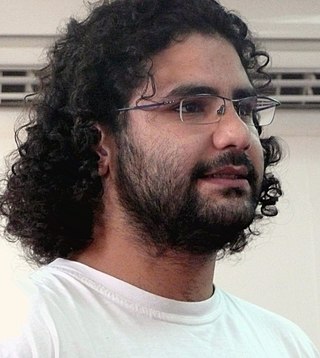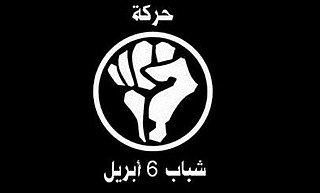Related Research Articles

Alaa Ahmed Seif Abd-El Fattah, known professionally as Alaa Abd El-Fattah, is an Egyptian-British blogger, software developer and a political activist. He has been active in developing Arabic-language versions of software and platforms. He was imprisoned in Egypt for allegedly organising a political protest without requesting authorization, though he was released on bail on 23 March 2014. He was rearrested and ordered released on bail again on 15 September 2014, subsequently sentenced to a month of jail in absentia, and received a five-year sentence in February 2015, which he was released from in late March 2019. Abd El-Fattah remained subject to a five-year parole period, requiring him to stay at a police station for 12 hours daily, from evening until morning. On 29 September, during the 2019 Egyptian protests, Abd El-Fattah was arrested by the National Security Agency and taken to State Security Prosecution on charges that were unknown as of 29 September 2019. He was subsequently convicted of "spreading fake news" and jailed for five years. In April 2022 he began a hunger strike.

The April 6 Youth Movement is an Egyptian activist group established in Spring 2008 to support the workers in El-Mahalla El-Kubra, an industrial town, who were planning to strike on 6 April.

Presidential elections were held in Egypt in 2012, with the first round on 23 and 24 May 2012 and the second on 16 and 17 June. The 2012 Egyptian Presidential election was the first democratic presidential election of Egypt’s history. The Muslim Brotherhood declared early 18 June 2012, that its candidate, Mohamed Morsi, won Egypt's presidential election, which would be the first victory of an Islamist as head of state in the Arab world. It was the second presidential election in Egypt's history with more than one candidate, following the 2005 election, and the first presidential election after the 2011 Egyptian revolution which ousted president Hosni Mubarak, during the Arab Spring. However, Morsi's presidency was brief and short-lived, and he later faced massive protests for and against his rule, only to be ousted in a military coup in July that year.

Mohammed Badie is the eighth Supreme Guide of the Muslim Brotherhood.

Mohamed Elbeltagy is an Egyptian physician and Muslim Brotherhood politician. He was a Member of Parliament from 2005 to 2010, and is currently the general secretary of the Freedom and Justice Party.

Ahmed Maher is one of the co-founders of the April 6 Youth Movement, and a prominent participant in the Egyptian revolution of 2011 demonstrations in Egypt in 2011. He is a civil engineer who works for a construction firm in New Cairo.

Hazem Salah Abu Ismail is an Egyptian lawyer, television preacher, and former presidential candidate. He was a host on The Fadfada Show which aired on Al-Nas Channel and is the founder of the Flag Party.
The al‑Nour Party(Arabic: حزب النور, romanized: Ḥizb an-Nūr), or "Party of The Light", is one of the political parties created in Egypt after the 2011 Egyptian Revolution. It has an ultra-conservative Islamist ideology, which believes in implementing strict Sharia law. It has been described as the political arm of the Salafi Call Society, and "by far the most prominent" of the several new Salafi parties in Egypt, which it has surpassed by virtue of its "long organizational and administrative experience" and "charismatic leaders". Its political aim is to establish a theocratic state on the lines of Wahhabism like in Saudi Arabia. Saudi Arabia was found to be the main financer of the party according to the public German television news service ARD (broadcaster).

Mohamed Mohamed Morsi Eissa al-Ayyat was an Egyptian politician, engineer and professor who served as the fifth president of Egypt, from 30 June 2012 to 3 July 2013, when General Abdel Fattah el-Sisi removed him from office in a coup d'état after protests in June. An Islamist affiliated with the Muslim Brotherhood organisation, Morsi led the Freedom and Justice Party from 2011 to 2012.

Mohammed Khairat Saad el-Shater is an Egyptian engineer, businessman and Islamist political activist. A leading member of the Muslim Brotherhood, as the Deputy Supreme Guide, el-Shater was the initial candidate of the movement's Freedom and Justice Party during the 2012 Egyptian presidential election before being disqualified by the election commission. Previously, he was the deputy chairman of the Brotherhood.

The Egyptian Constituent Assembly of 2012 (CA) is the committee for the creation of a new Constitution of Egypt. The Muslim Brotherhood had announced that the Constituent Assembly would vote on the constitution on 29 November 2012. The Constituent Assembly will be able to avoid its possible dissolution by voting on the constitution earlier than the release of a ruling by the Supreme Constitutional Court on the assembly's legitimacy; the ruling was expected to occur on 2 December 2012. The court has postponed the verdict in response to protests. The Constituent Assembly approved the constitution on 29 November 2012; more than 16 hours were spent voting on its articles.

The Strong Egypt Party is an Egyptian centrist political party founded in 2012 by former presidential candidate Abdel Moneim Aboul Fotouh.

The 2012–2013 Egyptian protests were part of the crisis in Egypt including the June 2013 protests, the July 2013 coup d'état, and part of the post-coup unrest. They saw varying opposition against three contiguous heads of state; namely, SCAF, Muslim Brotherhood, and the de facto ruling Egyptian Armed Forces.

Protests against the 2013 Egyptian coup d'état erupted in July 2013. Immediately following the removal of President Mohamed Morsi by the Egyptian Armed Forces on 3 July 2013 amid demonstrations against Morsi's rule, many protesters amassed near the Rabia Al-Adawiya Mosque to call for Morsi's return to power and condemn the military, while others demonstrated in support of the military and interim government. Deadly clashes such as Rabaa massacre continued for several days, with three particularly bloody incidents being described by officials as "massacres" perpetrated by security forces. During the month of Ramadan, prime minister Hazem al-Beblawy threatened to disperse the ongoing Pro-Morsi sit-ins in Rabaa al-Adaweya square and al-Nahda square. The government crackdown of these protests occurred in a violent dispersal on 14 August 2013. In mid-August, the violence directed by the army towards the protesters escalated, with hundreds killed, and the government declaring a month-long nighttime curfew.

The Freedom and Justice Party is an Egyptian Islamist political party. The ex-president of the party, Mohamed Morsi, won the 2012 presidential election, and in the 2011 parliamentary election it won more seats than any other party. It is nominally independent, but has strong links to the Muslim Brotherhood of Egypt, the largest political group in Egypt. The party was banned and dissolved in 2014; however, it continues to function underground.
Mohammed Adel is an Egyptian political activist and a founder of the April 6 Youth Movement in Egypt. He has been active with the Kefaya movement since 2005 and is one of activists who called for a general strike on April 6, 2008. In 2009, Mohammed Adel became the April 6 movement's media spokesman. Between the time of the 2008 strike in Mahalla al-Kubra and the onset of the 2011 Egyptian Revolution, Mohemmad Adel enrolled in a training program directed by the Center for Non-Violent Action and Strategies, an entity founded by the Serbian pro-democracy youth movement Otpor!.

Ahmed Douma is a prominent Egyptian activist and blogger, who has famously been arrested under each consecutive Egyptian government in recent years. He is a member of the Egyptian Popular Current.

The Constitution of the Arab Republic of Egypt is the fundamental law of Egypt.
The Ettehadiya case is a controversial legal case in Egypt where thousands of protesters went down to the Ittihadiya Palace, the Presidential offices in Cairo, asking for the repeal of the newly issued protest law as part of the international day for the solidarity with the Egyptian detainees on 21 June 2014. The march headed for the Heliopolis presidential Palace was demanding the repeal of the protest law and the release of prisoners of conscience - including prominent human rights activist Alaa Abd El-Fattah - was attacked by security forces using teargas and at least 30 activists were arrested among them award winning human rights defender Yara Sallam, young activist and filmmaker Sanaa Seif, and contemporary art dancer Mohamed Anwar Masoud Moftah.
References
- ↑ constitutionnet.org, Egypt: Law No.107 for 2013 For organizing the right to peaceful public meetings, processions and protests
- ↑ Arabic Wikisource, full text of the act in arabic
- ↑ "Interim President Adly Mansour signs controversial protests law". Egypt Independent. 24 November 2013. Retrieved 30 September 2014.
- ↑ "9 protesters sentenced to prison for violating protest law". Aswat Masriya. 30 September 2014. Retrieved 30 September 2014.
- ↑ "Opponents to new protest law vow to fight tooth and nail". Egypt Independent. 24 November 2013. Retrieved 30 September 2014.
- ↑ "Court allows prominent lawyer to challenge protest law". Egypt Independent. 17 June 2014. Retrieved 30 September 2014.
- ↑ "Egypt's protest law to be amended: NCHR member". Ahram Online. 8 September 2014. Retrieved 30 September 2014.
- ↑ "Egypt government reneges on amending protest law". Ahram Online. 18 September 2014. Retrieved 30 September 2014.
- ↑ "Egypt: Heavy prison sentence for Islamist women". AP. 27 November 2013. Archived from the original on 6 October 2014. Retrieved 30 September 2014.
- ↑ "Severe sentences for Alexandria female protesters spark Egypt outcry". Ahram Online. 28 November 2013. Retrieved 30 September 2014.
- ↑ "Appeals court reduces sentence of Islamist female protesters". Ahram Online. 7 December 2013. Retrieved 30 September 2014.
- ↑ "April 6 founder Ahmed Maher joins hunger strike". Ahram Online. 16 September 2014. Retrieved 30 September 2014.